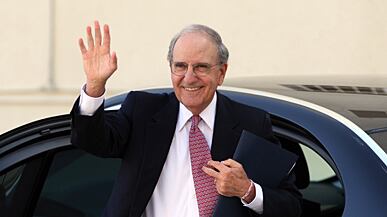Two days after Barack Obama's inauguration, George Mitchell was named special envoy for Middle East peace. With the new president standing beside Mitchell and Secretary of State Hillary Clinton, Vice President Joe Biden took the podium and extolled Mitchell's reputation and experience having brokered peace in Northern Ireland, calling him an "outstanding public servant" with "incredible capacity." In the press, Mitchell was praised as the right man for the job at the right time.
On Friday, though, that capacity had reached its limit, and Mitchell told his bosses in the West Wing that he'd had enough. His reasons, he said, were personal—the kind of nebulous rationale that leaves ample room for interpretation. Unmentioned were the months of frustration that Mitchell had built up as direct negotiations between Israelis and Palestinians became more difficult and the peace process further off.
The timing of Mitchell's departure couldn't be more awkward. Obama will meet with Israeli Prime Minister Benjamin Netanyahu and Jordan's King Abdullah next week, as well as deliver a major speech on Middle East policy. But the resignation didn't come as a surprise to those who worked closest with Mitchell. A State Department official described to Newsweek a man increasingly annoyed by both parties' constant moving of the goal posts and the constraints of the administration's unshakeable political instinct to support Israel.
The strain was noticeable in the Middle East. In a recent interview with Newsweek, one senior Israeli official said Mitchell often would say one thing about the direction the U.S. was taking with the two sides, only to be contradicted by Dennis Ross, Clinton's special adviser to the region. The official, who did not want to be quoted by name, said it seemed as if Mitchell had abdicated his role completely in recent months. Indeed, Mitchell's frequent visits to Israel and the West Bank slowed to a trickle; his last visit to the region was in December.
When he was there, officials on both sides of the conflict had voiced bewilderment at Mitchell's hands-off approach to the complex negotiating process. With a small staff in Israel, he would shuttle between Jerusalem and Ramallah to meet with senior advisers to the leaders of both sides and then leave after just a few days. In an interview with Newsweek last month, Palestinian President Mahmoud Abbas openly accused Mitchell of not doing his job. "Every visit by Mitchell, we talked to him and gave him some ideas," he said. "At the end we discovered that he didn't convey any of these ideas to the Israelis. What does it mean?"
“He wouldn’t be leaving at this important hour if he knew there was going to be a significant change in the administration’s attitude toward the peace process,” said Gregory Orfalea.

A politically attuned man who was once Senate Majority Leader, Mitchell was aware of the complaints about him. His usual comeback was to point to his success in Northern Ireland, which earned him the Presidential Medal of Freedom. For hundreds of days, he liked to say, he was considered a failure, until the final day, when he actually got it done.
Mitchell's resignation letter set off a small panic inside the West Wing earlier in the week. Senior advisers, as well as Obama himself, could sense the increasing difficulty of the job: Administration officials had been unable to convince Israel to halve new settlements in the West Bank, alienating Palestinians, and Israelis were irked in early May when Abbas allied with Hamas, a group that refuses to denounce violence against Israel. But the symbolism of Mitchell leaving several days before Obama's biggest week of outreach to the region projected a vacuum of confidence that anything hopeful, however remote, was on the horizon.
"He wouldn't be leaving at this important hour if he knew there was going to be a significant change in the administration's attitude toward the peace process," said Middle East analyst Gregory Orfalea, who formerly taught at Georgetown's School of Foreign Service. "He's leaving because it's status quo."
Mitchell will be replaced—in the interim by his deputy, David Hale—and another official will take a crack at the quandary. But despite new momentum from Netanyahu's visit next week and Obama's speech Thursday, Mitchell's departure could signal stagnant talks for the next several years. According to Fawaz Gerges, director of the London School of Economics' Middle East Center, "the reality is that, with Mitchell leaving, Barack Obama basically lost the ideological battle [over how to confront the peace process]. By now he'll have to wait for the second term before you can get another concerted effort."
With Dan Ephron in Jerusalem.
Daniel Stone is Newsweek's White House correspondent. He also covers national energy and environmental policy.






